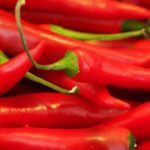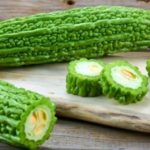Duck meat is commonly used in Vietnam to create flavorful and nutritious dishes. However, not everyone knows how to select high-quality duck meat with a thick and fragrant texture. Today, let’s explore some tips together!
1 Nutritional Value and Benefits of Duck Meat
Nutritional Value of Duck Meat
- 337 kcal
- 7.3 g fat
- 17.8 g protein
- 290 mg cholesterol
- 3360 mg sodium
- 76 mg calcium
- And more
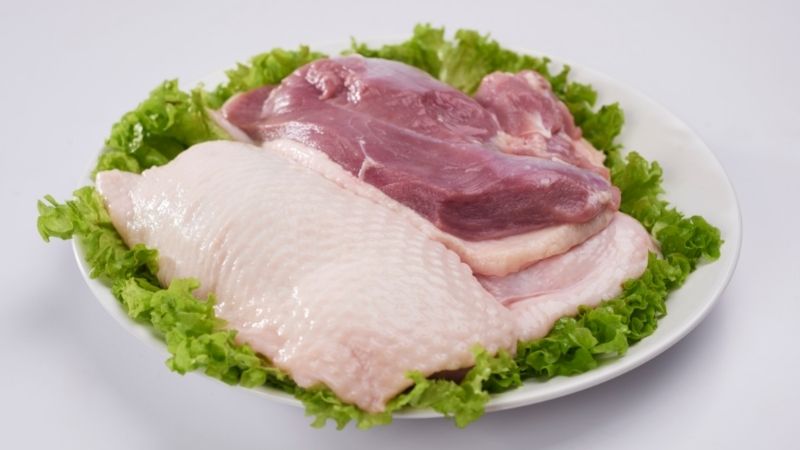
Nutritional value and benefits of duck meat
Benefits of Duck Meat for Health
- Reduces the risk of heart disease: Duck meat contains acids that effectively reduce and prevent cardiovascular problems.
- Good for bones: Animal protein, found in duck meat, improves bone density according to various studies.
- Antioxidant properties: Duck meat is rich in selenium, which acts as an anti-inflammatory agent, protects cells from damage, and enhances the immune system.
- Supports the thyroid gland: Adequate selenium consumption, found in about 250g of Pekin duck meat, is beneficial for thyroid health, providing more than 50% of the recommended daily selenium value.
2 How to Choose High-Quality Duck Meat
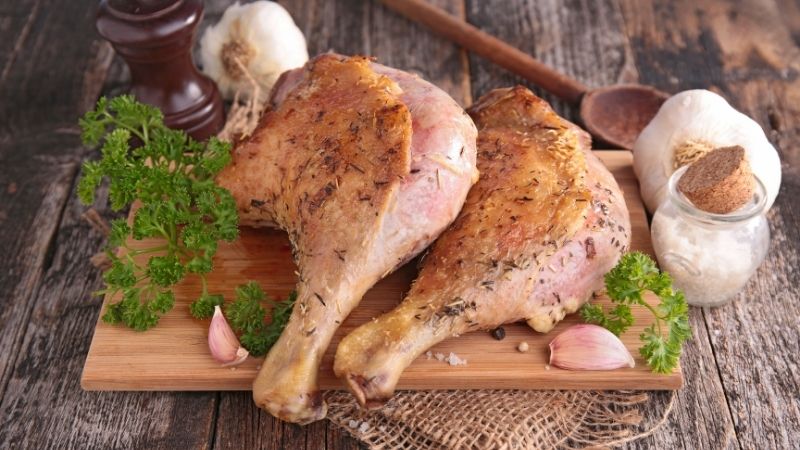
How to choose firm, thick and fragrant duck meat
In order to select high-quality duck meat, consider the following characteristics:
- Choose ducks of appropriate age, not too young or too old. Adult ducks should have sufficient feathers, wings that overlap when held together, a round breast with evenly distributed fat, and thick skin on the stomach and neck.
- Look for firm duck meat that is not excessively thin or fat. Squeeze the thighs and wings together to check if the back, breast, and thighs are firm and swollen, indicating a meaty duck.
- Avoid buying young ducks with large and soft beaks, or old ducks with small and hard beaks.
- Avoid choosing female ducks as male ducks are generally more delicious. Female ducks may have sagging bellies.
Additionally, if you notice a small red spot beneath the wings when flipping them, it indicates that the duck has been injected with drugs or water.
See also: Learn how to prepare restaurant-quality meals at home using common ingredients like garlic, chili, lime, and ginger.
Differentiating Young Ducks
You can differentiate young ducks based on:
- The size of the duck’s beak, as young ducks have larger and softer beaks compared to adult ducks.
- The overall size, with young ducks being smaller in size.
- The feathers, where young ducks have fewer feathers on their wings, but thick and short feathers grow inside. Mature ducks have more fully grown feathers on their wings, with longer and thicker feathers, fewer down feathers, and shorter inner feathers. The last few feathers on each wing of mature ducks are long enough to cross each other.
Differentiating Old Ducks
Old ducks can be identified by their smaller and very hard beaks, enlarged anus, sagging belly skin, and loss of feathers on their wings. These ducks are suitable for braising and stewing, but not for boiling, grilling, or marinating with sour fruits.
Differentiating Fat and Thin Ducks
To differentiate between fat and thin ducks:
Check the hip bone near the tail. Fat ducks will have soft and thick meat in that area, while thin ducks will have two protruding hip bones.
References: Fresh duck meat available at our establishment
Should You Choose Male or Female Ducks?
The secret to selecting delicious duck meat lies in choosing male ducks. Housewives often prefer male ducks for their more fragrant and firm meat, despite having larger bones compared to female ducks.
To differentiate between male and female ducks, consider the following characteristics:
- Female ducks have loud quacking sounds, while male ducks produce hoarse sounds.
- Male ducks have larger heads, hard and small beaks, small buttocks, round eyes, and light brown color. Pressing lightly on the genital area will reveal a small protruding tube, indicating a male duck. On the other hand, ducks that lay eggs usually have large buttocks, short wings, dark-colored eyes, and no protruding tube when the genital area is pressed.
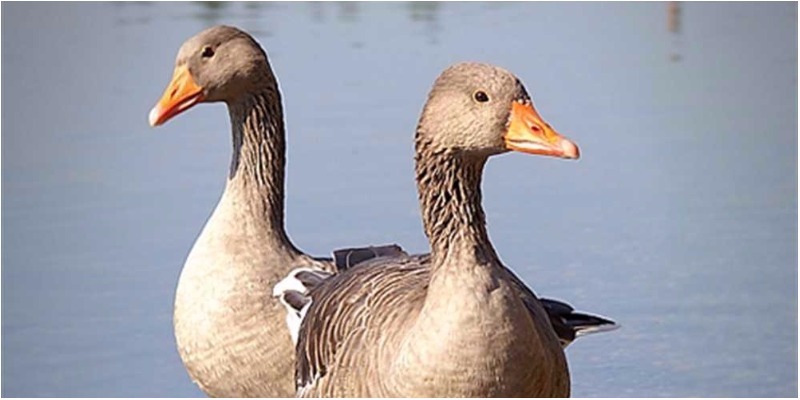
Choosing Ducks by Type
There are different types of ducks available:
Grass duck: Also known as flock duck, field duck, or Chinese duck. This popular breed has slender heads, flat and long beaks with distinctive yellow coloration, and feathers in various colors, most commonly brown or a combination of brown and white.
Pekin duck: Also known as Muscovy duck. Pekin ducks are large with thick bodies, plenty of meat, firm texture, and high fat content. They have white feathers, sometimes with black and blue coloration. These ducks have thick red skin around their beaks and eyes, resembling a crest. Male ducks have larger crests than female ducks.
Industrial duck: A specialized meat breed known for its high productivity. These ducks have white feathers, long bodies, enlarged chests, well-developed thighs, large heads and necks, long and wide beaks, and tall legs with light yellow or orange colors. Industrial ducks have thick, lean meat with a relatively short raising time of about 45-50 days.
3 Notes for Consuming and Storing Duck Meat
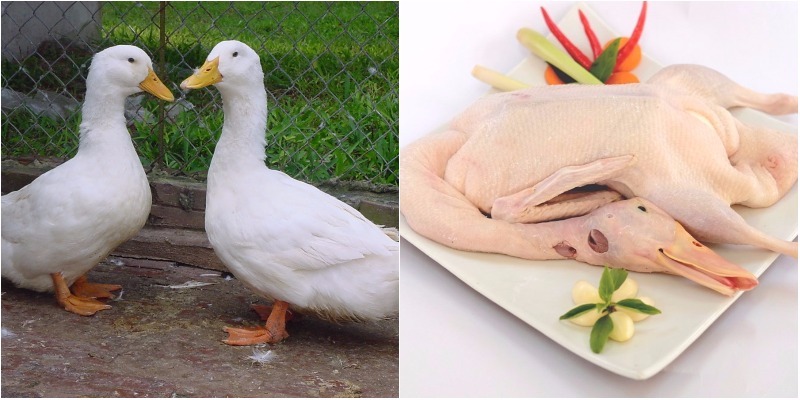
While duck meat offers numerous benefits, it is important to handle it properly to avoid any negative effects. Here are some notes to consider:
- Due to its high calorie content, consuming too much duck meat may lead to weight gain.
- Cooked duck fat is susceptible to oxidation, which can result in degraded and potentially harmful food.
- According to USDA recommendations, duck meat should be cooked to an internal temperature of 165 degrees F (74 degrees C).
After purchasing duck meat, it should be thoroughly cleaned and stored in a ziplock bag or well-sealed plastic bag. To extend its shelf life, store duck meat in the freezer.
4 Delicious Dishes Made with Duck Meat
Cool Five-Fruit Duck
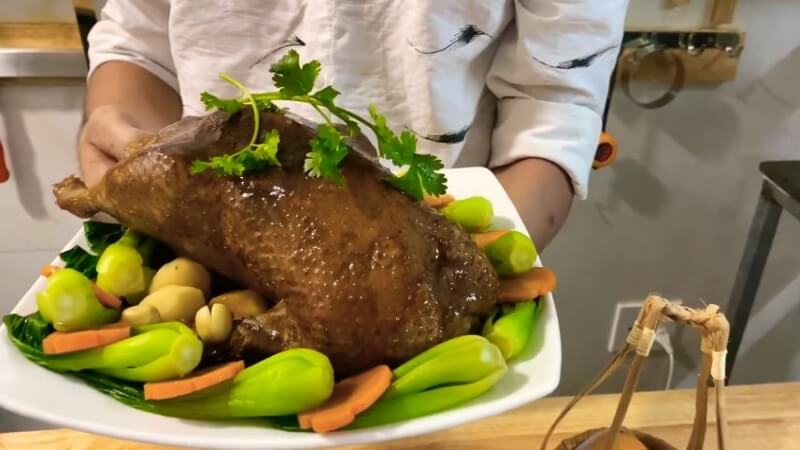
Cool Five-Fruit Duck
Cool Five-Fruit Duck is a popular Chinese dish known for its nourishing and detoxifying properties. The combination of stewed duck meat and fruits creates a delicious and appealing dish, often served with fried buns and cabbage for a delightful dining experience.
Duck and Bamboo Shoot Hot Pot
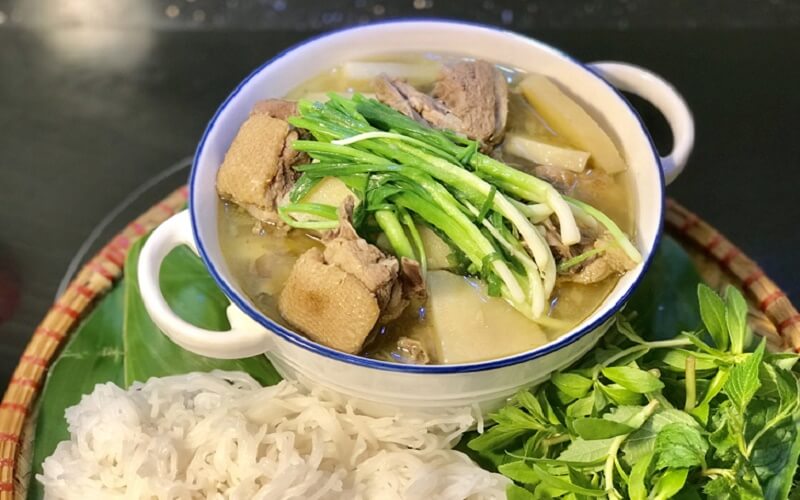
Duck and Bamboo Shoot Hot Pot
Duck and Bamboo Shoot Hot Pot offers a refreshing flavor with tender duck meat and crispy, sweet fresh bamboo shoots. The flavorful broth complements the dish perfectly. It is typically served with raw vegetables, ginger fish sauce, and fresh noodles to enhance the dining experience.
Braised Duck with Bamboo Shoots
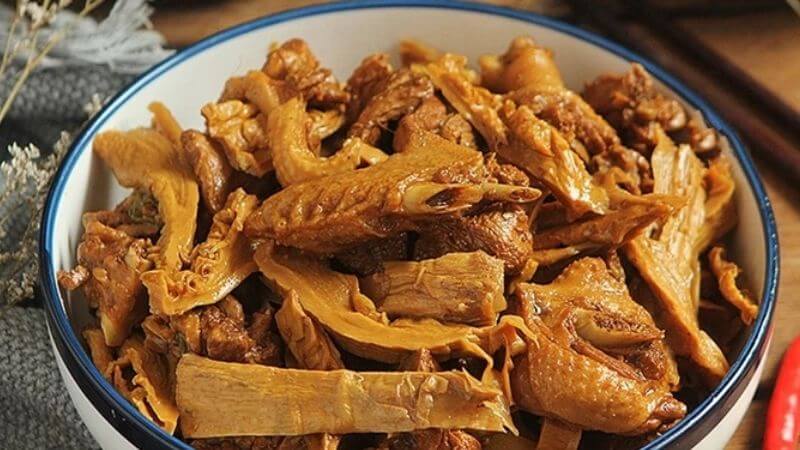
Braised Duck with Bamboo Shoots
Braised Duck with Bamboo Shoots is a simple yet satisfying dish. The duck meat is well-prepared, free from unpleasant smells, and accompanied by crispy and delicious bamboo shoots. Together, these ingredients create a flavorful and delightful dish.
Duck Porridge and Duck Salad
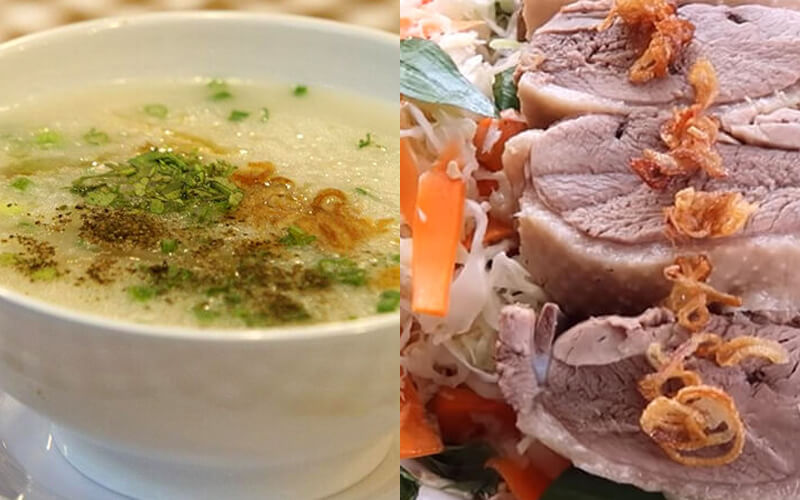
Duck Porridge, Duck Salad
Duck meat has a sweet and cold flavor, making it suitable for dishes that are both delicious and healthy. Duck Porridge and Duck Salad are examples of such dishes that highlight the tender meat and health benefits of duck.
Duck Braised in Chinese Herbal Medicine
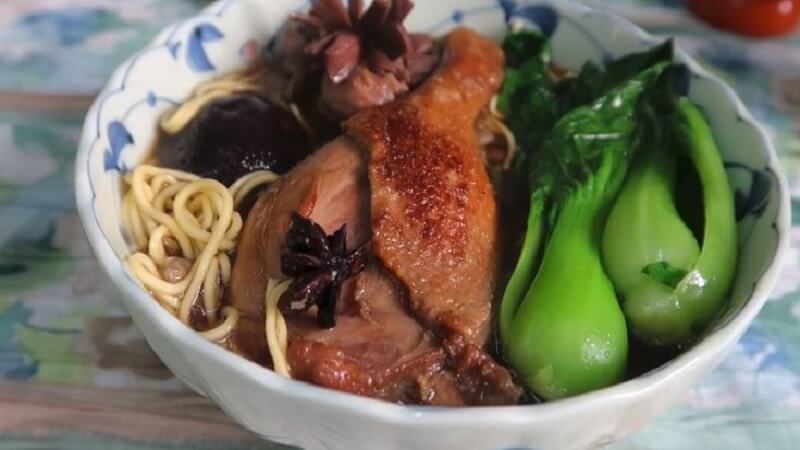
Duck Braised in Chinese Herbal Medicine
Duck Braised in Chinese Herbal Medicine is a typical Chinese dish with rich flavor and nutritional benefits. The dish features well-prepared duck meat with a slight herbal scent, resulting in a delicious broth.
Duck Braised in Ginger Sauce
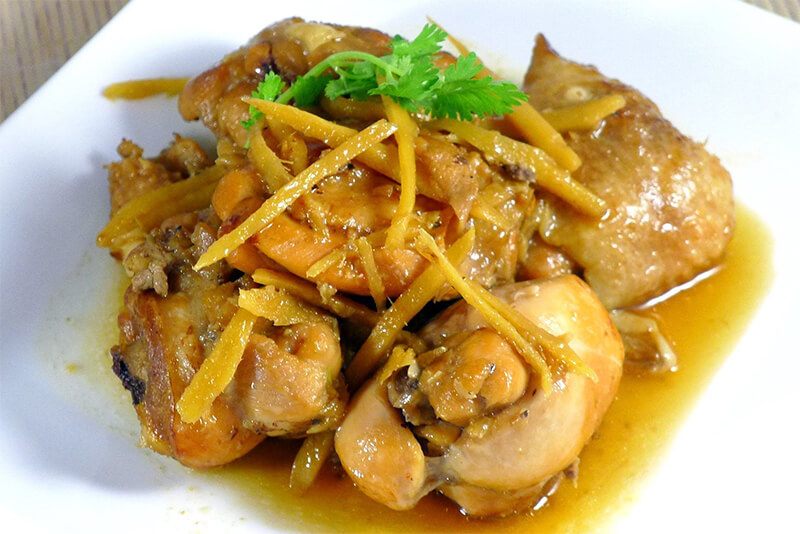
Duck Braised in Ginger Sauce
Duck Braised in Ginger Sauce, also known as Duck Stir-fry with Ginger Sauce, offers delicious flavor along with numerous health benefits. The tender meat combined with the aromatic ginger creates a dish that will satisfy your taste buds.
Duck with Coconut Juice
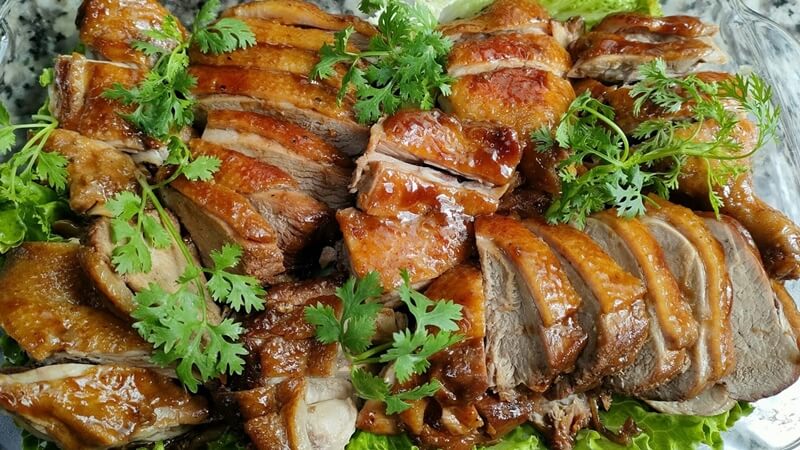
Duck with Coconut Juice
Duck with Coconut Juice is a simple and rustic dish popular in the Mekong Delta region. The fatty and fragrant duck meat combined with coconut juice and five-spice sauce creates a delightful taste that rivals any fancy dish.
5 Our Establishment: The Best Duck Meat Supermarket
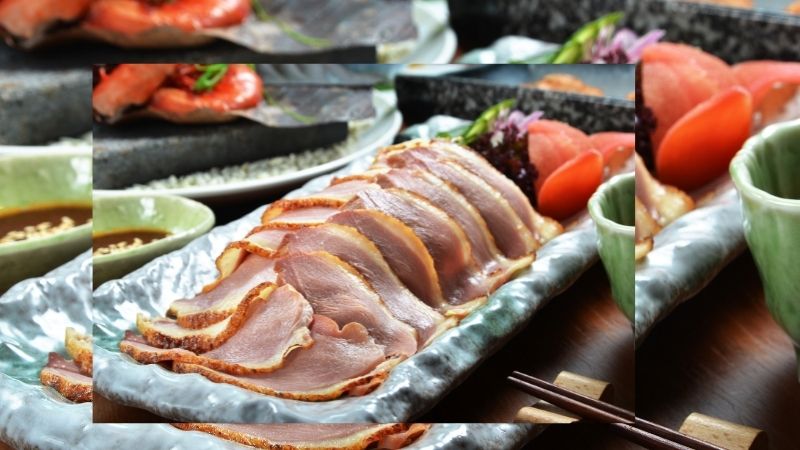
Our Establishment: The Best Duck Meat Supermarket



























